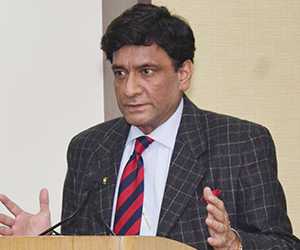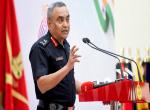Since the recent episodes on our side of the Line of Control in January 2013, there has been a spate of articles seeking to justify and somehow explain the Pakistani actions, even if many are prefaced with the pro-forma demurral that the beheadings – this time and in the past - were condemnable. Many of the spurious arguments used by the appeasers of Pakistan have been disposed of in earlier writings; one of the newer ones has been that the Indian Army has done similar things. Happily, Raksha Mantri Antony has denied these allegations, and so has the former Army Chief, Gen Malik. But this has not settled matters. Proof of the culpability of the Indian Army, as adduced in some sections of our media, is that Pakistan has lodged several such accusations against the Indian Army with the UN Military Observers Group for India and Pakistan [UNMOGIP] over the last decades. This latter body has, in turn, taken this up with India, but has received no reply.
There is a history to all this, and it would be important for the unbiased reader to be aware of this and draw the correct conclusion regarding these kinds of arguments. There was a time when UNMOGIP played an active role along the Cease-Fire Line, as it was called before the 1972 Simla Agreement, and India was dealing with this body on a continuing basis. The last time that it played a substantive role was in 1965, especially in the run-up to the war that broke out in the autumn of that year. The events that led to war were, as usual, precipitated by Pakistani action in sending infiltrators across the LOC, while denying any role in this. By now, this is Standard Operating Procedure, but then it was relatively new, having been done only once before, in September-October 1947.
Accordingly, both sides complained to UNMOGIP in August 1965. That body was then headed by an Australian, Lt Gen Robert Nimmo, who had been its head since 1950. He enquired into the charges made by both sides and submitted his report to the UN Secretary General, U Thant. The latter made a report to the full Security Council on 3 September 1965, and reported as follows.
“UNMOGIP received an Indian complaint of Pakistani shelling, on 1 September, of pickets and a battalion Headquarters in the Chamb area of the Jammu-Bhimber sector of the Cease-Fire Line. The complaint stated that at 0230 hours on that date one and a half Pakistani tank squadrons crossed the Cease-Fire Line in this area supported by artillery. Pakistani artillery was also said to have fired on a battalion Headquarters in the Punch area from 1630 on 1 September and on an Indian battalion Headquarters in the Jangar area. The substance of these complaints was subsequently confirmed by United Nations Military Observers. A Pakistani complaint reported that Indian soldiers had crossed the CFL in strength in the Kargil, Tithwal, and Uri-Punch sectors as reported above. Pakistan, in this complaint also affirmed the crossing of the CFL by Pakistan troops in the Bhimber area on 1 September as a defensive measure to forestall Indian action, asserting also that in this sector the Indian Air Force had taken offensive action against Pakistan troops. Also on 1 September armed infiltrators ambushed an Indian convoy at Gund north-east of Srinagar on the Leh road and both sides sustained casualties. On 2 September the Jammu team of UNMOGIP received an Indian complaint that Pakistan aircraft had attacked the road between Chamb and Jaurian during the morning of 2 September and that Jaurian village was in flames. The air attack on Jaurian village was confirmed by UN Military Observers.” [Emphasis added].
The purpose of this long quote and the added emphasis is to demonstrate that the Indian complaints were confirmed by Gen Nimmo, while the Pakistani complaints were not. This is important, because, as mentioned above, the charges against the Indian Army in recent years rest on the record of Pakistani charges against it, and lodged with the UNMOGIP. It is another of Pakistani SOP’s to make such false charges, and the events of 1965, which were subjected to comprehensive scrutiny by UNMOGIP and the UN Security Council, testify to this.
Gen Nimmo died in January 1966 in Islamabad, apparently of a heart attack, this being the very day that the Tashkent Conference began. Prime Minister Shastri died at the end of the Conference.
There is more: this may be seen in the statement made by Secretary General U Thant, which again deserves to be quoted at length.
“In mid-June of this year [1965] for example, Gen Nimmo reported that during the five months, a total of 2231 complaints from both sides charging violation of the Cease Fire had been submitted to UNMOGIP. Most of these involved firing across the CFL [Cease Fire Line], although some concerned crossings of the Line by armed men. As of that date, 377 violations in all categories had been confirmed by the Observers…”.
The point to note is that there was a gross exaggeration in the number of incidents alleged to have taken place. This was at a time when India used to maintain contact with UNMOGIP, and there was the danger that charges would be proved false, as did indeed happen regularly. Today, when India no longer deals with that body’s complaints, it would be tempting for Pakistan to make even more charges than in 1965. It is safe therefore to conclude that the charges being purveyed in the media today are wild exaggerations.
The Nimmo Report itself was never made public. The records show that Prime Minister Shastri wanted it made public, but found no support among the principal actors – USSR, USA and the UK. He acknowledged that the Report had some negative things to say about the conduct of India too, but its conclusions were unequivocal and placed the blame on Pakistan. It is probably not too late even now for our Ministries of Defence and External Affairs to upload these on their websites, and fulfil Shastri’s wishes.
To sum up, what the record shows is that Pakistan has been habitually misrepresenting the facts to the international community, and it should not surprise anyone that this continues today. Both in terms of the number of charges, and, more importantly, in terms of the veracity of the allegations, the historical record shows that reports made by Pakistan to UNMOGIP were just not true. The dishonesty was taking place right from the start, of course, but they were being made even at a time when there was the serious risk of their being challenged and proven false. Today, India no longer has any truck with UNMOGIP, and it is therefore much safer to trump up charges against it. For Pakistan, it is a safe bet: India will not answer, and so the appeasers in India can repeat and endorse the allegation. Alternatively, India is forced to answer, and thereby brings UNMOGIP – and by extension, the UN – back into play on the Kashmir issue.
There is an important tail-piece to the 1965 episode described above. The Security Council meeting of 3 September was followed by a debate on 6 September at which the Indian Foreign Secretary, CS Jha, [and a representative of Pakistan] was also present. The speech of the Indian representative contains the following passage. He was responding to the Pakistani charge that India was in Kashmir as a colonial power.
“If there is colonialism, it exists in Pakistan. The Pashtuns, the Baluch, and the East Pakistanis, are being ruled without any regard to their civil rights, to their fundamental human rights and freedoms. This is colonialism as the world understands it.”
Events since then, with the emergence of an independent Bangladesh and the on-going resistance in Baluchistan, certainly provide a ringing endorsement of the Indian Foreign Secretary’s judgement.
As to UNMOGIP itself, the fact is that Shastri wanted its numbers to be increased in 1965, so that it could do a more thorough job of monitoring. This did not happen, unfortunately, and after 1972, India stopped all dealings with UNMOGIP. The important thing is to see this to completion, and wind up the operations of the body on the Indian side, even if Pakistan will not agree to this on its side.
There remains the question of why the appeasers and pro-Pakistan elements are so gullible as to buy into any allegation against the Indian Army. The motive behind such reports requires to be examined and understood, so that the public at least is not misled.
Published Date: 5th February 2013







.jpg)


Post new comment